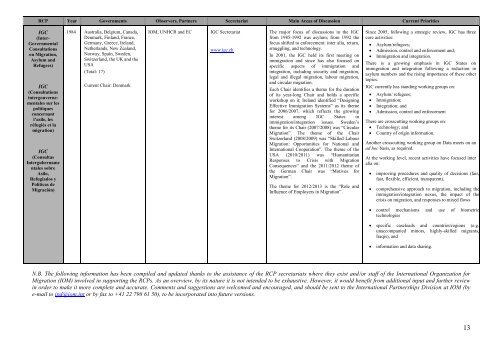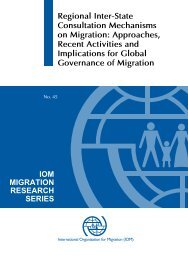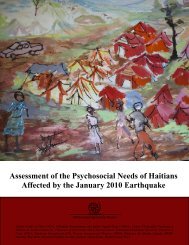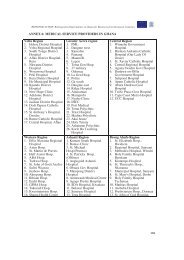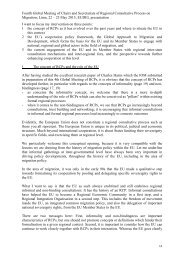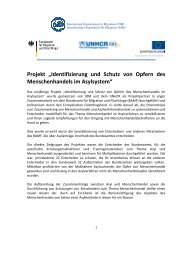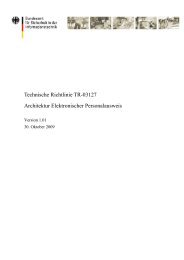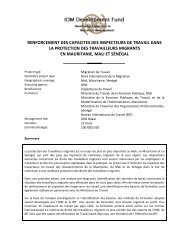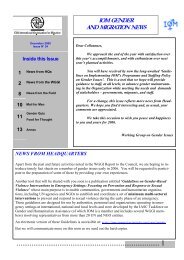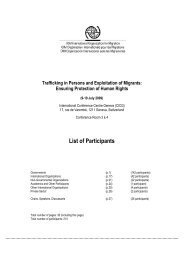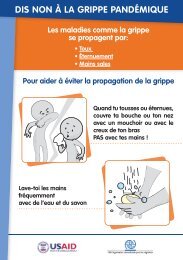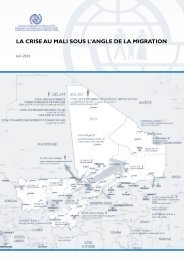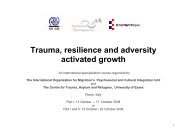Overview of Principal RCPs - International Organization for Migration
Overview of Principal RCPs - International Organization for Migration
Overview of Principal RCPs - International Organization for Migration
You also want an ePaper? Increase the reach of your titles
YUMPU automatically turns print PDFs into web optimized ePapers that Google loves.
RCP Year Governments Observers, Partners Secretariat Main Areas <strong>of</strong> Discussion Current Priorities<br />
IGC<br />
(Inter-<br />
Governmental<br />
Consultations<br />
on <strong>Migration</strong>,<br />
Asylum and<br />
Refugees)<br />
IGC<br />
(Consultations<br />
intergouvernementales<br />
sur les<br />
politiques<br />
concernant<br />
l’asile, les<br />
réfugiés et la<br />
migration)<br />
IGC<br />
(Consultas<br />
Intergubername<br />
ntales sobre<br />
Asilo,<br />
Refugiados y<br />
Políticas de<br />
Migración)<br />
1984 Australia, Belgium, Canada,<br />
Denmark, Finland, France,<br />
Germany, Greece, Ireland,<br />
Netherlands, New Zealand,<br />
Norway, Spain, Sweden,<br />
Switzerland, the UK and the<br />
USA<br />
(Total: 17)<br />
Current Chair: Denmark<br />
IOM, UNHCR and EC<br />
IGC Secretariat<br />
www.igc.ch<br />
The major focus <strong>of</strong> discussions in the IGC<br />
from 1985-1992 was asylum; from 1992 the<br />
focus shifted to en<strong>for</strong>cement: inter alia, return,<br />
smuggling, and technology.<br />
In 2001, the IGC held its first meeting on<br />
immigration and since has also focused on<br />
specific aspects <strong>of</strong> immigration and<br />
integration, including security and migration,<br />
legal and illegal migration, labour migration,<br />
and circular migration.<br />
Each Chair identifies a theme <strong>for</strong> the duration<br />
<strong>of</strong> its year-long Chair and holds a specific<br />
workshop on it; Ireland identified “Designing<br />
Effective Immigration Systems” as its theme<br />
<strong>for</strong> 2006/2007, which reflects the growing<br />
interest among IGC States in<br />
immigration/integration issues. Sweden’s<br />
theme <strong>for</strong> its Chair (2007/2008) was “Circular<br />
<strong>Migration</strong>”. The theme <strong>of</strong> the Chair<br />
Switzerland (2008/2009) was “Skilled Labour<br />
<strong>Migration</strong>: Opportunities <strong>for</strong> National and<br />
<strong>International</strong> Cooperation”. The theme <strong>of</strong> the<br />
USA (2010/2011) was “Humanitarian<br />
Responses to Crisis with <strong>Migration</strong><br />
Consequences” and the 2011/2012 theme <strong>of</strong><br />
the German Chair was “Motives <strong>for</strong><br />
<strong>Migration</strong>”.<br />
The theme <strong>for</strong> 2012/2013 is the “Role and<br />
Influence <strong>of</strong> Employers in <strong>Migration</strong>”.<br />
Since 2005, following a strategic review, IGC has three<br />
core activities:<br />
Asylum/refugees;<br />
Admission, control and en<strong>for</strong>cement and;<br />
Immigration and integration.<br />
There is a growing emphasis in IGC States on<br />
immigration and integration following a reduction in<br />
asylum numbers and the rising importance <strong>of</strong> these other<br />
topics.<br />
IGC currently has standing working groups on:<br />
<br />
<br />
<br />
<br />
Asylum/ refugees;<br />
Immigration;<br />
Integration; and<br />
Admission, control and en<strong>for</strong>cement<br />
There are crosscutting working groups on:<br />
Technology; and<br />
Country <strong>of</strong> origin in<strong>for</strong>mation.<br />
Another crosscutting working group on Data meets on an<br />
ad hoc basis, as required.<br />
At the working level, recent activities have focused inter<br />
alia on:<br />
<br />
<br />
improving procedures and quality <strong>of</strong> decisions (fair,<br />
fast, flexible, efficient, transparent),<br />
comprehensive approach to migration, including the<br />
immigration/integration nexus, the impact <strong>of</strong> the<br />
crisis on migration, and responses to mixed flows<br />
control mechanisms and use <strong>of</strong> biometric<br />
technologies<br />
specific caseloads and countries/regions (e.g.<br />
unaccompanied minors, highly-skilled migrants,<br />
Iraqis), and<br />
<br />
in<strong>for</strong>mation and data sharing.<br />
N.B. The following in<strong>for</strong>mation has been compiled and updated thanks to the assistance <strong>of</strong> the RCP secretariats where they exist and/or staff <strong>of</strong> the <strong>International</strong> <strong>Organization</strong> <strong>for</strong><br />
<strong>Migration</strong> (IOM) involved in supporting the <strong>RCPs</strong>. As an overview, by its nature it is not intended to be exhaustive. However, it would benefit from additional input and further review<br />
in order to make it more complete and accurate. Comments and suggestions are welcomed and encouraged, and should be sent to the <strong>International</strong> Partnerships Division at IOM (by<br />
e-mail to ipd@iom.int or by fax to +41 22 798 61 50), to be incorporated into future versions.<br />
13


